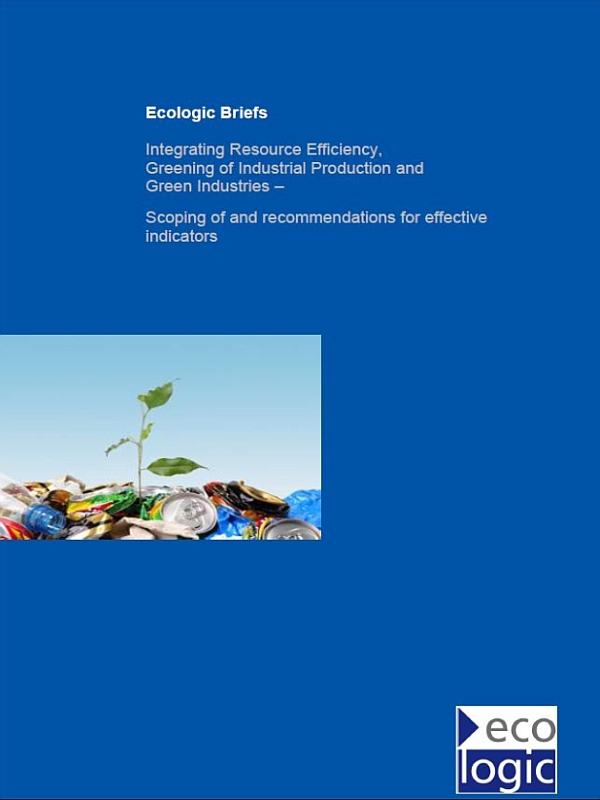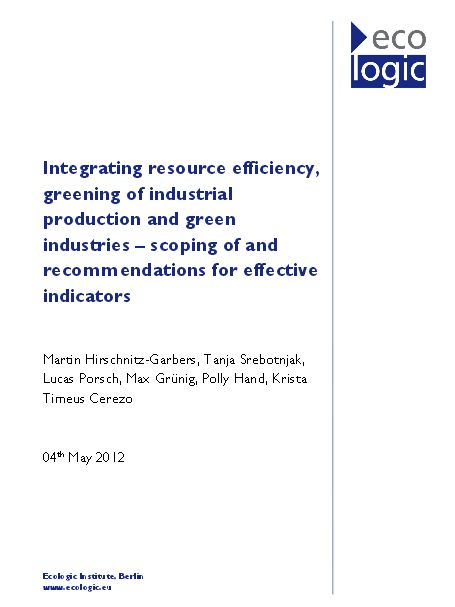Resource Indicators for Sustainable Industries and Sustainable Industrial Development (RISI)
- Project
- Duration
-
-
Fostering sustainable industries and industrial development requires the use of effective indicators. Though a multitude of indicators exist, their applicability to sustainable industries remains largely unaddressed to date. In this project, Ecologic Institute reviewed scientific knowledge in order to evaluate existing indicators and derive recommendations concerning their usability and potential need for further indicator development. Ecologic Institute published a shorter version of the project results as a policy brief. The policy brief is available for download.
Increasing resource efficiency is one of the core themes of sustainable development, aiming to facilitate the improvement of socio-economic well-being while reducing resource use and its associated environmental impacts. Though in this context sustainable industries and sustainable industrial development must play a crucial role globally, both in alleviating poverty and in achieving development without adverse environmental impacts, they are still only marginally addressed.
This is reflected in the discussions towards supplementing and integrating the United Nations Millennium Development Goals (MDGs) with Sustainable Development Goals (SDGs), to be defined and agreed on in the course of the Rio+20 process. Both MDGs and SDGs appear to lack specific targets for industries and industrial development.
While the MDGs outline concrete, partly quantifiable objectives to drastically reduce extreme poverty by 2015, they do not provide guidance or indicators on improving resource efficiency and in particular do not address the industrial sector. Though the SDGs proposed by the Governments of Colombia and Guatemala [pdf, 455 kB, English] include resources relevant to industries and industrial development (in particular water and energy), they make no reference to industries or industrial development.
However, sustainable development on a global level can only be achieved when industries and industrial development commit themselves to sustainable resource management and greater resource efficiency, for instance by improving resource efficiency in the consumption of natural resources for production processes. Therefore, it is increasingly being discussed to supplement the SDGs proposed for Rio +20 with goals relating to sustainable industries and sustainable industrial development.
Effective indicators are necessary in order to monitor and measure the progress towards these goals. In this context, the scope of sustainable development requires indicators to cover the environmental, social and economic dimension of sustainability.
Further Links:
- Ecologic Institute Presentation: Measuring Sustainability - Conceptual Foundations and Indicators
- Ecologic Institute Project: Environmental sustainability thresholds and indicators
- Ecologic Institute Project: Environmental Pressure Index
- Ecologic Institute Project: Indicator-based environmental reporting
- Ecologic Institute Project: Integrating Mainstream Economic Indicators with Sustainable Development Objectives (IN-STREAM)
- Ecologic Institute Project: Potential of the Ecological Footprint for monitoring environmental impact from natural resource use
- Ecologic Institute Project: Beyond GDP - Measuring progress, true wealth, and the well-being of nations
- Ecologic Institute Project: One Planet Economy Network: Europe (OPEN: EU)
- Ecologic Institute Project: Development of a Scoring System for Assessment of Sustainable Seafood
- Ecologic Institute Project: Water Economics, Ecosystem Accounts and Water Resource Efficiency
- Ecologic Institute Publication: Integrating Ecological, Carbon and Water footprint into a "Footprint Family" of indicators: Definition and role in tracking human pressure on the planet
- Ecologic Institute Publication: Pre-modelling analysis of the Footprint Family of indicators in EU and international policy contexts





